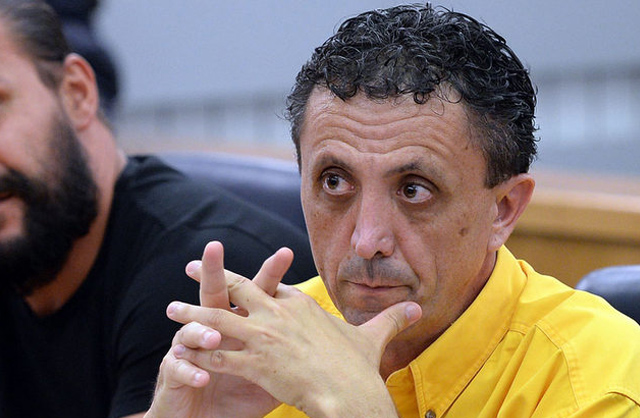The pre-trial detention of journalist Tomislav Kezharovski is contrary to the European Convention on Human Rights
July 26, 2013

The Helsinki Committee for Human Rights, acting upon the request for free legal assistance by Mrs. Marina Kezarovska, the performed review of the submitted documentation from the case of Tomislav Cezarovski, established that the Criminal Council adopted the decisions in a procedure and in a manner which is contrary to the European Convention on Human Rights and the case law of the European Court for Human Rights. Essential and procedural violations have been made regarding the evaluation and argumentation about the necessity for prolongation of the detention by the Primary Court and the lack of action regarding the complaint by the Appeal Court in Skopje.
The explanation of the causes for collective prolongation of the detention in the decision of the Criminal Council on June 26th is contained in only one page. It is stated that there is danger of escape due to the type and the severity of the established sanction, as well as the circumstance that Mr. Kezarovski does not own any real estate. The second reason refers to the possibility the defendant to influence the investigation through witnesses and concealment of evidence, whereas the third reason refers to the danger of an eventual committing of a new criminal act.
The second decision regarding the detention measure from July 24th comes after the completion of the investigation and the submission of an indictment. The explanation of this decision is contained in less than a page. The Criminal Council justifies the detention identically as in the first decision and the only difference is the omission of the second reason- influencing witnesses and concealment of evidence- taking into consideration that the investigation is completed. The Helsinki Committee for Human Rights indicates that the established case law of the European Court estimates that while deciding the prolongation of the detention measure, the judges must list the reasons for their decision i.e. to explain in detail why they consider that the person will make an escape.
In the case of Tomislav Kezarovski there is a situation of adopting decisions in an identical manner, through stereotypical formulation of the sentences and without explanation of the causes due to which there is danger of escape which represents violation to the Convention.[1] The judges must describe in detail the specific situation of the detained person,[2] and the practice of issuing collective decisions which leads to prolonged detention of a group of persons without any separate estimation of the grounds is determined as impermissible by the European Court[3].
Regarding the third reason of the Criminal council – the danger of committing a new criminal act, it is necessary to accentuate that according to the Law on Criminal Procedure special circumstances are needed to justify the fear that Mr. Kezarovski would commit such an act. The Criminal Council does not list a single fact to substantiate its opinion that a new criminal act could be committed.
Except the disputed decisions of the Primary Court Skopje 1, the actions of the Appeal Court in Skopje are worrying, which even after a month did not begin to evaluate the complaint allegations stated against the decision of the Criminal Council on June 26th. In this case it is a matter of deciding to prolong the detention for 30 days. Therefore, if the decision is appealed, the complaint must be reviewed and a decision must be made before the Criminal Council has made a new decision for prolongation of the detention. With the intentional and unintentional lack of action, the Appeal Court has violated the effectiveness of the appeal process and thereby has violated the European Convention for Human Rights.
Thereby, the clients in the so called “Liquidation” case have the opportunity to submit a complaint against the Republic of Macedonia in front of the European Court for Human Rights. In accordance with the widely accepted principles of international law there are circumstances which release the defendants from using the available domestic legal remedies.[4] This is because according to the European Court the official tolerance by the state authorities, which makes the procedures pointless and ineffective, releases the defendants from use of domestic legal remedies which must be clear enough, not only theoretically (as it is established in the Law on Criminal Procedure), but also in practice.[5]
Therefore, the Helsinki Committee calls upon the Appeal court in Skopje to seriously review the complaint allegations against the last decision of the Criminal Council with which on July 24th once again the detention of the journalist Tomislav Kezarovski was prolonged. Thereby, the Helsinki Committee reminds that after the completion of the investigation except the detention as the most extreme measure, also alternative measures such as house arrest, guarantee (which is already offered by the family of Mr. Kezarovski), revocation of travel documents, etc. are available to the court.
The Helsinki Committee due to a lack of a suitable reaction by the Macedonian courts is prepared to initiate an appeals procedure in front of the European Court for Human Rights.
[1] Yagci and Sargin v Turkey (16419/90), 8 June 1995, para. 52.
[2] Smirnova v Russia (46133/99 and 48183/99), 24 July 2003, para. 70.
[3] Vasilkoski v Republic of Macedonia (28169/08), 28 October 2010, para. 63.
[4] Sejdovic v Italy (56581/00), 1 March 2006, para. 55.
[5] Aksoy v. Turkey (21987/93), 18 December 1996, para. 52.


